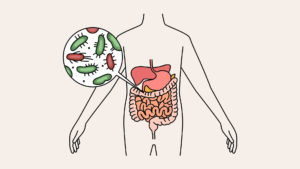Understanding the 10 signs of an unhealthy gut that shows the imbalance going on inside our bodies is very important. A healthy gut affects everything from digestion to mental health because it is essential for general well-being. Some signs of a bad gut health are not normal and show something disturbing. Early detection of these symptoms can assist you in taking action to improve your digestive health and restore equilibrium.
Understanding the concept of an unhealthy gut is important before signs of a bad gut health.
A state in which the digestive system is not operating at its best is referred to as an unhealthy gut. This can be brought on by unbalanced gut flora, poor intestinal health, or other conditions that interfere with regular digestion. The complex collection of bacteria, viruses, fungi, and other microorganisms that inhabit the digestive system is known as the gut microbiome.
Optimal digestion, vitamin absorption, and general health must have a healthy gut flora. The effects of gut health can extend to general health. It may result in chronic inflammation, which has been connected to some illnesses, including autoimmune disorders, diabetes, heart disease, and obesity. Furthermore, because of the gut-brain relationship, an unbalanced gut flora might impact mental health by affecting mood, stress levels, and cognitive performance.
10 signs of an unhealthy gut

The following are some common indicators of an unhealthy gut:
-
Digestive Problems
Following are the signs of a bad gut health in digestive problems.
These problems may consist of Bloating: One common symptom after eating is feeling uncomfortable full or puffy in the abdomen. It may be brought on by an overabundance of gas production or irregularities in the digestive system’s muscle movement.
Constipation: If you have trouble passing stool or have irregular bowel motions, your gut may not be working properly. This may be brought on by a bacterial imbalance in the gut, dehydration, or a lack of fiber.
Diarrhea: Another common indicator of a gut imbalance is loose or watery feces. Food intolerances, infections, or a deficiency of good bacteria in the stomach can all contribute to this.
Gas: An abundance of gas may be a sign that some foods are difficult for your digestive system to process. An imbalance in the gut microbiota may be the cause of this.
-
Gut imbalance
The mix of good and bad bacteria is present in a healthy gut. A disturbance in this equilibrium may result in multiple problems:
Gut Imbalance: several digestive issues can be brought on by an excess of bad bacteria or yeast in the stomach. Stress, antibiotics, poor food, and other factors may be to blame for this imbalance.
Leaky gut: Also referred to as increased intestinal permeability, this condition is brought on by damage to the intestinal lining, which permits germs, toxins, and partially digested food particles to enter the circulation. This may cause inflammation and result in several health problems.
-
Food intolerances:
Intestinal dysfunctions can lead to the development of food intolerances. In contrast to food allergies, which are reactions of the immune system, food intolerances are frequently caused by the gut’s incapacity to adequately digest particular foods. Two common food intolerances include gluten (found in wheat and other grains) and lactose (found in dairy products).

-
Unexpected Weight Shifts
Unexpected weight increase or decrease may also indicate gastrointestinal distress. An unbalanced stomach can impact the body’s capacity to absorb nutrients, control blood sugar levels, and accumulate fat. While malnutrition may be the cause of weight loss, insulin resistance or hormone imbalances in the gut may be the cause of weight gain.
-
Skin Problems
There is a connection between intestinal health and skin disorders like acne. Inflammatory skin disorders can be brought on by gut inflammation brought on by a poor diet or dietary intolerance. The appearance of the skin can be enhanced by a healthy gut since it can lower inflammation and aid in cleansing.
-
Restless Nights and Constant Exhaustion
Chronic weariness and poor sleep can both be attributed to gut health issues. A large amount of the body’s serotonin, a hormone that influences mood and sleep, is produced and regulated by the stomach. Unbalances in the gut can interfere with serotonin synthesis, which can cause fatigue and difficulty falling asleep.
-
Autoimmune Conditions
An increasing amount of evidence points to the possibility that gut health issues can impact immune system functions and raise systemic inflammation. Autoimmune illnesses could result from this, in which the body targets its own tissues.
Ways to Boost Gut Health

You must take action to enhance your intestinal health if you identify any of these symptoms.
Consume a Balanced Diet: Pay attention to a diet high in whole grains, fruits, and vegetables as well as lean proteins. Steer clear of sugar, processed foods, and too much alcohol.
Incorporate Probiotics and Prebiotics: Fermented foods such as kefir, sauerkraut, and yogurt contain probiotics, which are good microorganisms. Prebiotics, which can be found in foods like garlic, onions, and bananas, are specific kinds of fiber that nourish these good bacteria.
Keep Yourself Hydrated: To help with digestion and nutrient absorption, sip lots of water.
Control Stress: Prolonged stress might be detrimental to intestinal health. Engage in stress-relieving activities like yoga, meditation, and deep breathing.
Exercise Frequently: By encouraging regular bowel movements and lowering inflammation, physical activity can support the maintenance of a healthy gut.
Get Enough Sleep: To promote general health, including gut health, aim for 7-8 hours of good sleep every night. You can enhance your general health and promote gut health by being aware of these symptoms and acting accordingly.













